The Matrix is famous for its spectacular action sequences and its distinct sense of style. But it's also notorious for burying all that silver-screen excitement under a heavy-handed parable filled with overt biblical references and assorted philosophical agendas. Either way, the movies' premise--artificially intelligent machines have incarcerated humankind in a virtual prison resembling our everyday lives, whose rules can be bent and broken by will alone--makes for a compelling setting for a massively multiplayer online role-playing game. Sure enough, the Matrix Online has a lot of original ideas that are clearly inspired by concepts from the movies it's based on. Granted, it's not that different from the many other games of its kind, since it's characterized by the same sort of time-consuming and generally repetitive gameplay that's conventional to the genre. It's also beset with glitches and an overall lack of polish, above and beyond what's par for the course in a style of gaming in which rough edges are to be expected. It's not that this is a game that only hardcore Matrix fans would enjoy (since they certainly might not), it's that it takes the same sort of person who can appreciate the entire movie trilogy in spite of its flaws to appreciate this game. It's got some very good qualities, but you'll need to wade through a lot of potential frustrations to enjoy them.
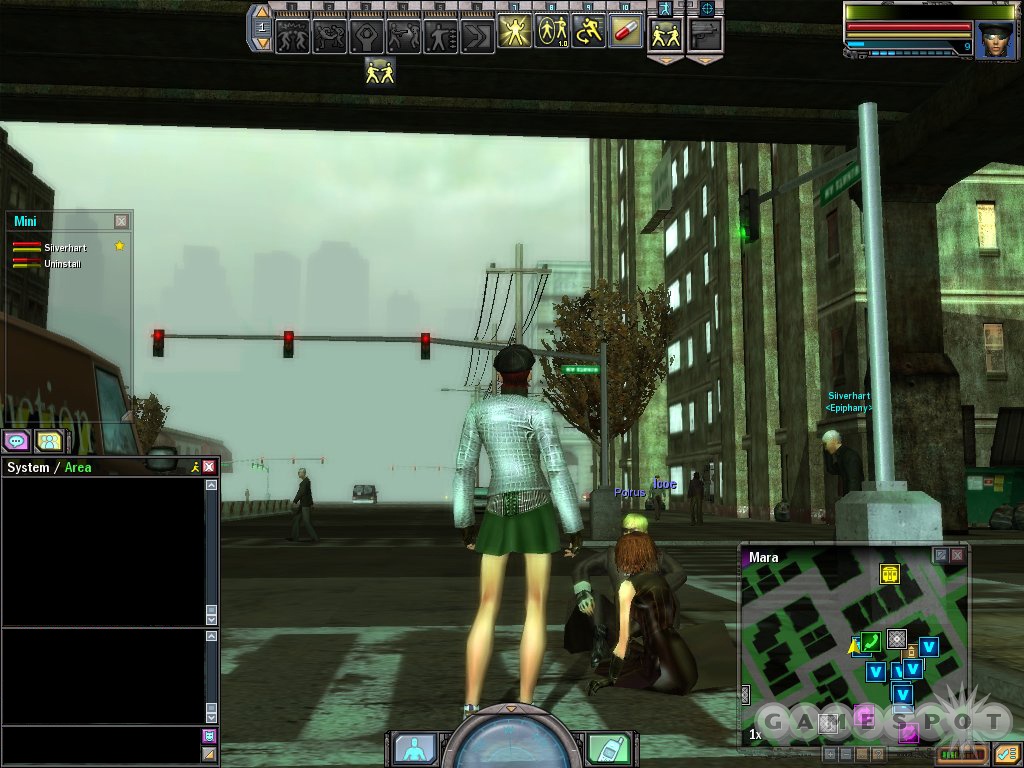
The Matrix Online takes place in the Matrix itself (a place also known as the Metro World) after the conclusion of The Matrix Revolutions, during a time of an uneasy truce between the machines and the humans. A third group called the exiles, comprising self-aware humanlike programs that have appropriated the Matrix as their home, further complicates matters. Amid all this, you play as a newly awakened "redpill"--a human freed from servitude to the machines and made conscious of the state of the real world and the nature of the Matrix. You'll initially begin your journey in the service of Zion, the last bastion of humankind on Earth, who'll help train you to survive and thrive in The Matrix. But, soon enough, you'll have the option of choosing to align yourself with any of the three organizations vying for priority in the Matrix.
One of the most enticing aspects of The Matrix Online, at least in theory, is the promise of an evolving storyline that develops based on players' actions. The game has a smattering of voice-over to augment key moments, such as your meetings with the leaders of the different factions, but most of the "story," such as it is, unfolds in simple text messages during the many missions you'll undertake. The dialogue is sprinkled with occasional typos and isn't especially remarkable otherwise, but Matrix devotees will still like to think that their actions in the game have a greater meaning. And, to the game's credit, it does a good job of defining the discrete identities of the three major organizations: the determined humans, struggling to coexist with their one-time oppressors; the machines, working to assert their authority in a changing world; and the exiles, a shadowy group resembling a criminal underworld. While the humans are ostensibly the "good guys" in the struggle, the other two sides are somewhat sympathetic in their own right, and being able to play as a human in league with the machines or the exiles is an interesting option. In practice, though, your choice of allegiance doesn't have a significant impact on what you do in the game. You'll be undertaking similar types of missions over and over no matter what, and the only difference is that you'll be performing them for one organization at the expense of the other two.
The nuts and bolts of the gameplay in The Matrix Online are reminiscent of what you do in other online RPGs, so much so that even the manual acknowledges that the Metro World's "hackers" and "operatives" are equivalent to the wizards and warriors you'd find in other such games. So if you've played other online RPGs before--especially ones with science fiction elements, such as Anarchy Online or City of Heroes--then you'll be in fairly familiar territory from the moment you start playing The Matrix Online. Gameplay is heavily focused on quasi-turn-based combat, structured around randomly generated missions that send you to different locations in search of targets or objects. You earn currency, experience points, and loot (in the form of guns, gender-specific clothing, and other items) from accomplishing these missions and from defeating opponents. You may take on missions alone or in teams consisting of several players. It's also possible for players to form more-permanent groups of up to a dozen, called "crews" (like the hovercraft crews seen in the Matrix movies), and multiple crews can form a "faction," which is equivalent to a guild in other games of this type. In addition to fighting foes using hand-to-hand combat, guns, and "viruses" (i.e., magic spells), players can create useful items by "compiling" them. In short, The Matrix Online offers most of the features you may have come to expect from this kind of game, though they're all thinly veiled within the fiction of the game's universe. Despite a somewhat clunky interface, The Matrix Online also has a few of its own perks, such as a built-in media player and built-in AOL Instant Messenger compatibility.
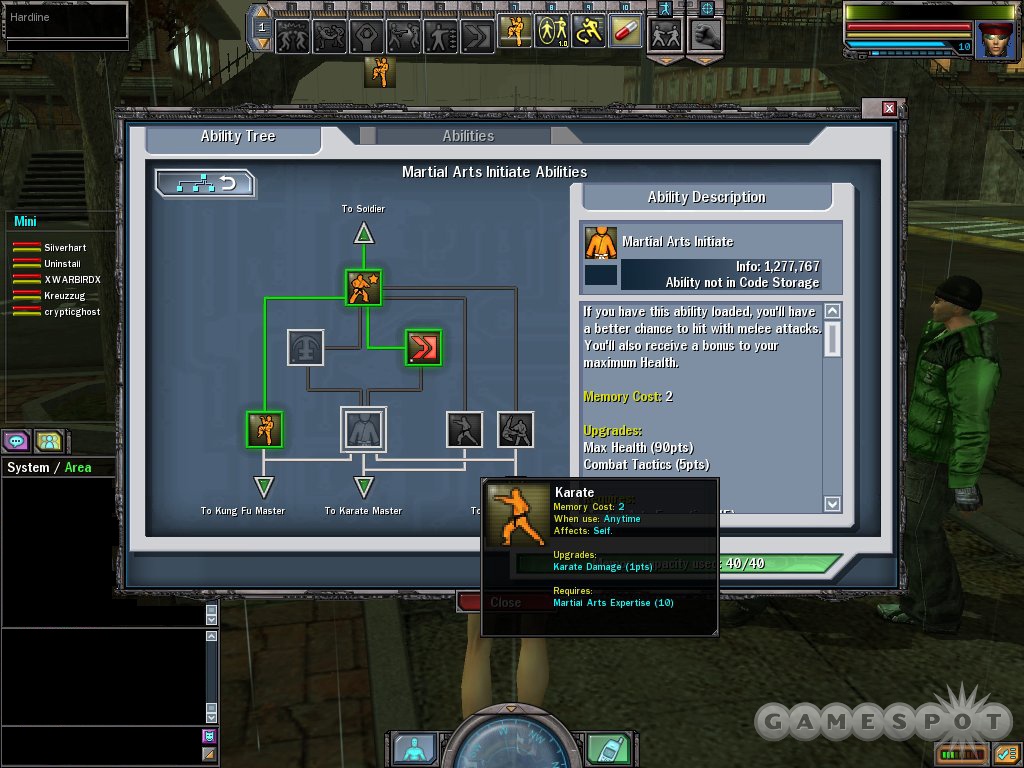
Probably the most original trait of The Matrix Online is how it doesn't force players to lock themselves into a particular character profession, but instead allows them the freedom to mix and match different abilities at their whim. So, much like how Neo rapidly mastered a variety of martial arts or how Trinity suddenly understood how to fly a helicopter just in the nick of time, it's possible to customize your character's proficiencies in The Matrix Online and make dramatic changes to your skill set on the fly. But the system isn't as open-ended as you might expect. As in other online RPGs, your character has an overall experience level, which directly influences both how powerful you are and how many abilities you can have "loaded" at the same time. It also limits which abilities you're capable of using. So, for example, while every character begins with basic self-defense skills, it's not until you reach the 10th level--which should take the average player from 20 to 30 hours of play--that you can learn kung fu (and karate and aikido).
Also, your character has certain innate statistics, such as "belief" and "perception," which make him or her predisposed toward one style of play or another. This means that, even though it's theoretically possible to unload all your martial art expert character's abilities and replace them with those of, say, a "patcher" (i.e., a healer/priest/cleric), your character might not excel in the new role. Furthermore, a rather strict "memory capacity" limit, as dictated by your character's level, means that you can either specialize by choosing as many abilities as possible within one of the game's three different branches--coder, hacker, and operative--or be a jack-of-all-trades by picking a smattering of abilities across two or three branches. Predictably enough, much of the player population of the game seems to gravitate toward the "operative" branch, which is where all the martial art and firearms skills are found. At any rate, the game's ability system is fairly complicated and fairly unusual, but it ultimately boils down to giving you the same sorts of choices that you get in other games like this. If you want to be on the front lines, slugging it out with exile programs, or if you'd prefer to support your fellow players with helpful programs, the game lets you. One interesting aspect is that, while some abilities can be purchased from vendors or found as loot, others can be crafted, which helps foster interaction and commerce between players.
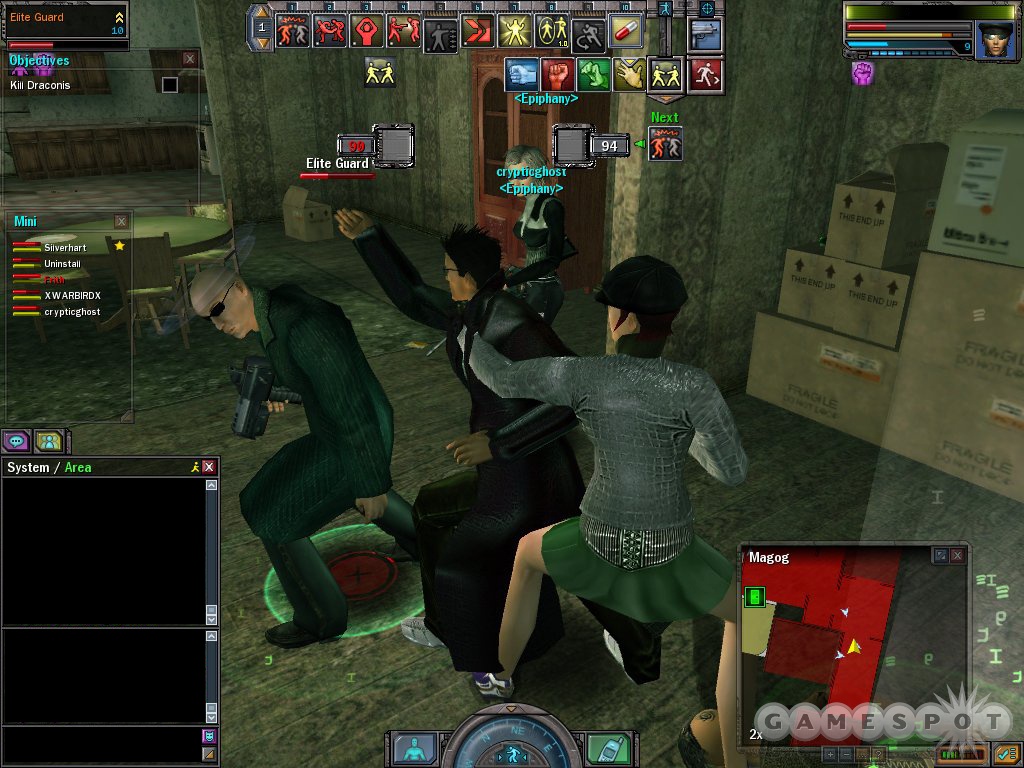
Combat in The Matrix Online is emblematic of the entire game, in that some aspects of it are unique and appealing yet the entire system is decidedly rough around the edges. Hand-to-hand combat involves what The Matrix Online refers to as the "interlock" system, in which two characters square off in choreographed martial art showdowns. In true kung fu movie fashion, if multiple characters target a single foe with hand-to-hand attacks, they'll then take turns exchanging blows one after another, rather than striking all at once. Of course, there's nothing to stop several characters from firing on a target simultaneously with assault rifles, pistols, shotguns, submachine guns, and so on. As you might expect from having played other role-playing games with guns in them, guns really aren't any stronger than martial art moves, though they weren't so effective in the Matrix movies, either.
Interlock combat allows characters to execute different tactics, including basic offensive and defensive maneuvers, as well as various special moves. Special moves drain from your "inner strength" pool, equivalent to your mana or energy or what have you. In a nod to pen-and-paper role-playing games, whether your moves succeed or fail essentially depends on a random die roll by you and your opponent--whoever wins the roll hits his or her adversary. Some types of moves confer certain bonuses, while others may inflict status ailments on the opponent, causing their subsequent rolls to suffer a penalty. At any rate, it's not impossible for a weaker character to hit a stronger one, thanks to the luck of the draw. Also, when dueling against human opponents, showdowns effectively become a guessing game in which you try to repel your foe's strongest tactics and counter with your own.
In practice, the interlock combat is pretty interesting and fun to watch, even though you'll be seeing a lot of the same animations over and over--including the occasional slow-motion beat down, courtesy of the bullet-time effect. You'll gain powerful, new moves as you gain in levels, and the various attacks at your disposal certainly seem very strong. The system really isn't so different from the combat you've experienced in other online RPGs, if you've played any, but it's different enough. Unfortunately, the choppy frame rate and occasional bugged animations take away from the experience. These problems are especially noticeable if you're fighting as part of a group, at which time combat tends to devolve into a frantic, stuttering mess (albeit a potentially entertaining one). Regardless, the foes you'll be facing aren't very interesting to fight, as they're pretty much all the same. You'll see hoods standing around in alleyways and enemies loitering about in your mission areas, and both groups tend to attack on sight.
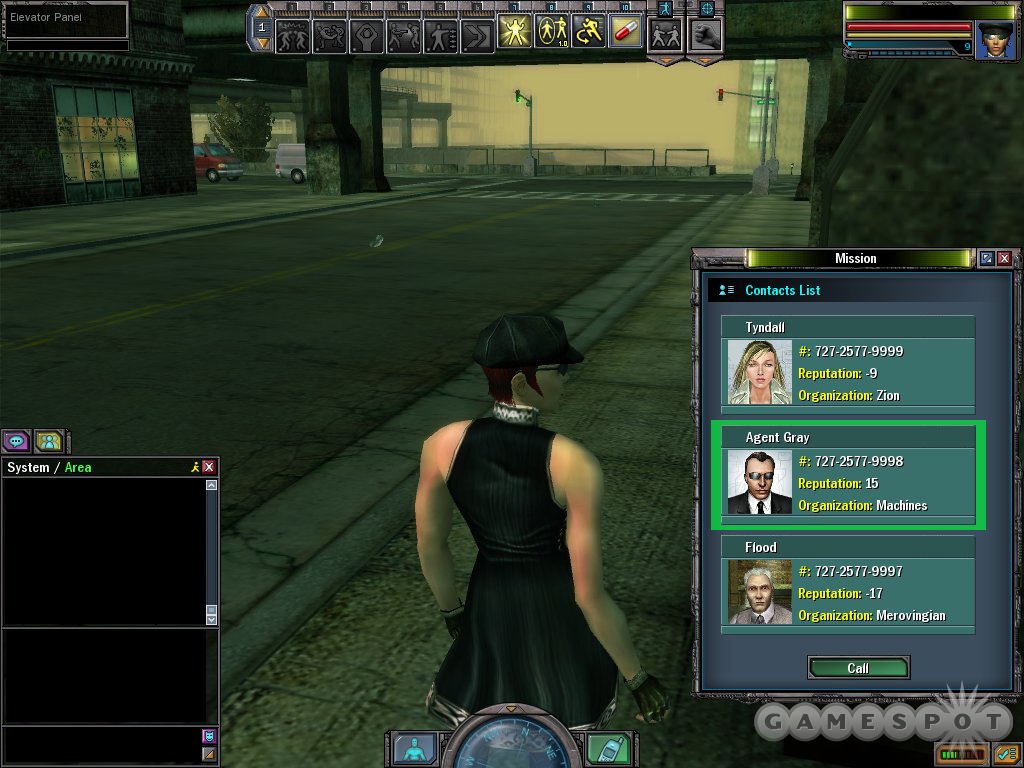
Missions in The Matrix Online are as repetitive as the combat--meaning, they're just interesting and varied enough to be fairly addictive, but not diverse enough that you lose sight of the fact that you're doing the same thing over and over. Eventually, you reach a stage where you can elect to take on missions of varying type, length, and difficulty. But even with these parameters under your control, most missions still boil down to hightailing it to a certain building, then clearing a floor of enemies either for the sake of it or in search of a given item, after which point you need to head somewhere else. You can teleport between different "hardlines" (which look like phone booths) that you've discovered in the Matrix and you can also take the subway. But even after you've learned how to hyperjump across building rooftops, you still might wish you could drive. How come the bluepills get cars?
Many missions have multiple stages, and while it's possible to finish them on your own, it's much more efficient to plow through them with a group of other players. The missions inherently aren't that interesting, though it's nice that you can take on a mission pretty much at any time, beginning at any location. Nevertheless, the best incentive to spend most of your time undertaking missions is that they're by far the fastest means of earning experience points. Of course, this is assuming you don't run into some sort of blatant bug, such as an invisible wall, which will prevent you from accomplishing the mission objective (this sort of thing happened to us enough times during our testing that it turned into a constant source of anxiety). Agents got nothing on mission bugs.
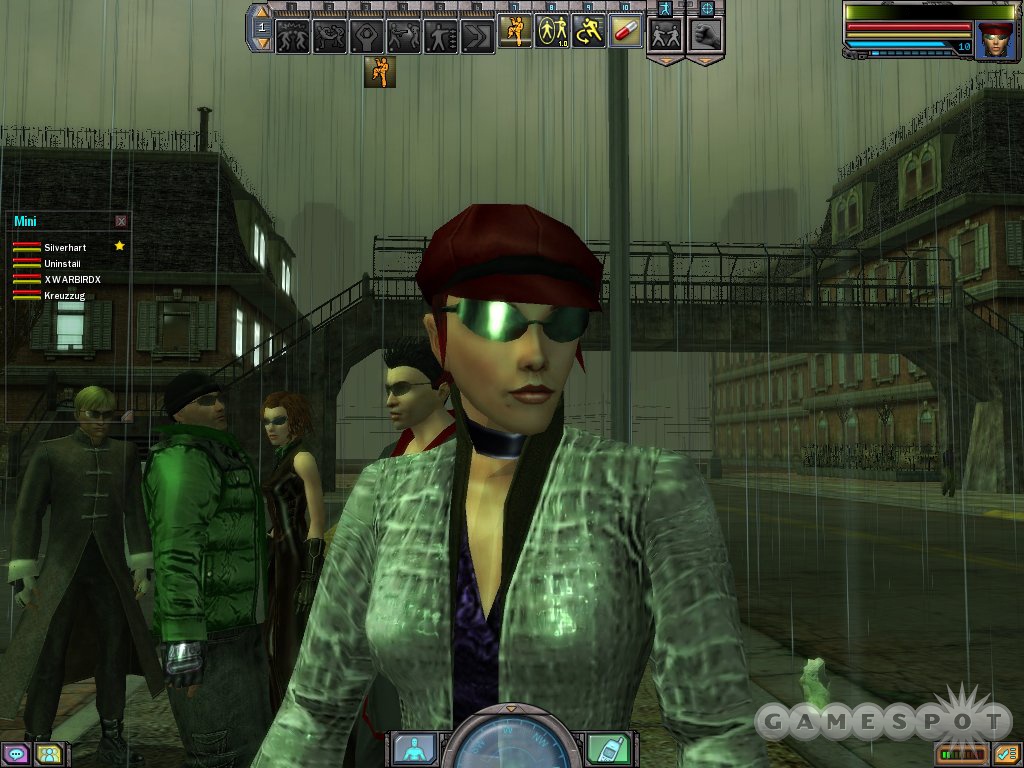
Besides going on the same sorts of missions over and over, the world of The Matrix Online offers some other types of content to explore, such as dance clubs in which you can stand around and execute one of your character's different dance animations for no good reason, exile hideouts that are functionally equivalent to dungeons filled with monsters and treasure, and the archives, which are ancient, dangerous, and contested areas of the Matrix that look much different from the megalopolis you'll get so used to seeing. Accessible only by relatively experienced characters, the archives permit player-versus-player combat between opposing organizations.
The presentation of The Matrix Online ought to have been one of the game's high points, but it's potentially a showstopper. Though the game doesn't look remarkably different or better than other online RPGs on the market, it demands top-of-the-line hardware and lots and lots of RAM to achieve acceptable performance...probably because the game gives you the freedom to seamlessly (well, sort of) explore both the streets as well as the building interiors of Metro World. When all the different visual touches are enabled, The Matrix Online is capable of looking great, with a soft-focused, almost dreamlike look to it that captures the sense that the world of the Matrix is realistic but also slightly, unsettlingly off--much like the feeling you got watching the first half of the first movie for the first time. The experience is undermined, though, due to the presence of numerous cheeky in-game advertisements for other Warner Bros. movies. Or maybe they just contribute to the oppressive feel of being in The Matrix? The game's also got pretty good audio, including effective but repetitive musical cues reminiscent of the movies' memorable score. The sound effects are the highlight, though. While most of the guns sound a little frail, punches and kicks make the same furious whipping noises from the movies and come across just as powerful and painful as a result.
However, even on high-end hardware, you'll still experience numerous hitches, fits, and starts as you play. These problems are exacerbated in areas where many players congregate and on systems that don't exceed the recommended requirements, where you'll need to strip away a lot of the nice visual effects just to get a halfway decent frame rate. Even when the game is running at full steam, you'll spot a lot of repetitive textures on buildings. You'll also notice that there isn't that much detail in the characters and there's not all that much variety in their outfits either. For example, you'll see way too many guys running around in cowboy hats. And the game's animations, while impressively similar to the movies' martial art choreography at times, often play out awkwardly. One other point in the game's favor is that it has lots of different social "emote" animations, including multiple types of dances and even some two-character animations (hugs and kisses and things). In summary, The Matrix Online looks better than average for an online role-playing game, but it doesn't live up to the visual splendor of its namesake.
One rather irritating aspect of the game is that the special "loading area" you end up in whenever you "die" in the Matrix, and which you have to visit to access the player-run marketplace and your full inventory, is poorly implemented. In practice, it takes an uncomfortably long time to load up (even on very fast systems), probably in part because it forces the game to switch resolutions. Also, most of the several times that the game crashed on us during our testing occured during these transitions, which made the penalty of dying in the game feel more punishing than it ought to have. Player death theoretically isn't intended to be severely demoralizing in The Matrix Online, since it only amounts to a temporary penalty to your abilities and the potential loss of any items you didn't "upload." But since death can come swiftly and often, it can be pretty disappointing to have to frequently stare at static screens while waiting to get back into the game.
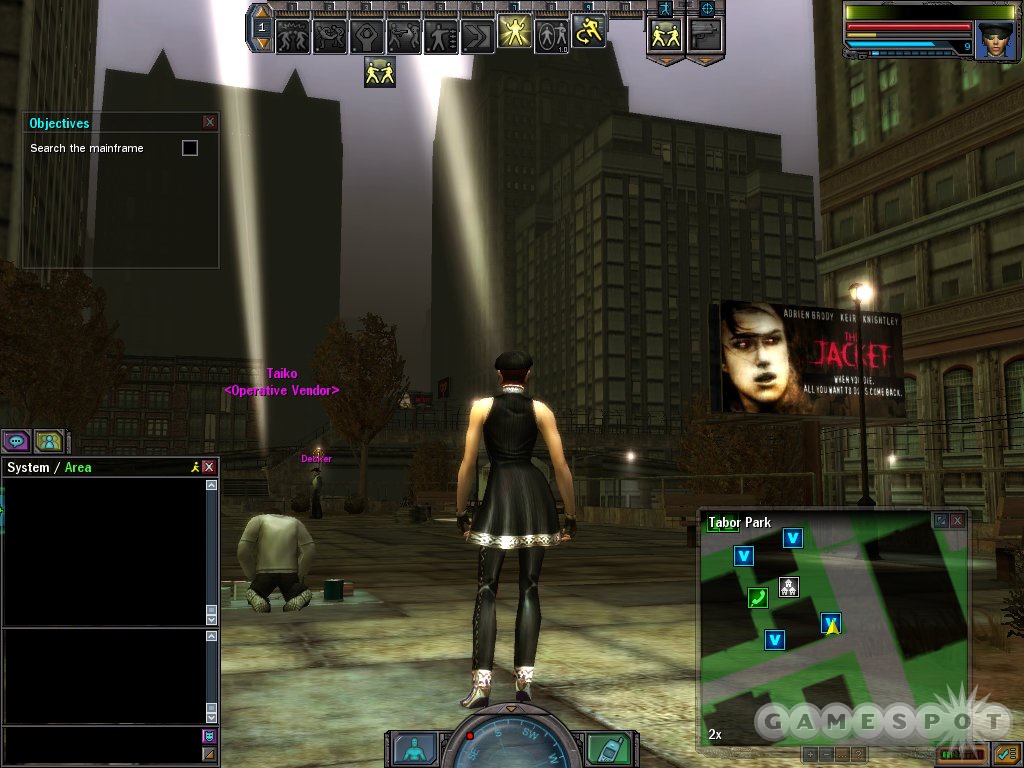
There's a lot to like about The Matrix Online, and as an extension of a movie franchise that left audiences with more questions than answers, it's certainly got a lot of potential, if only from a storytelling standpoint. But the game serves up more than enough impediments to sap its strengths. It's recommendable to veterans of other online role-playing games who have experienced the trials and tribulations of this style of gaming and are willing to put up with more of the same types of problems they've probably experienced in the past, in the name of a new experience. It's also recommendable to open-minded Matrix fans who weren't fazed by the backlash against the movie sequels. But otherwise, don't expect The Matrix Online to make a believer out of you.